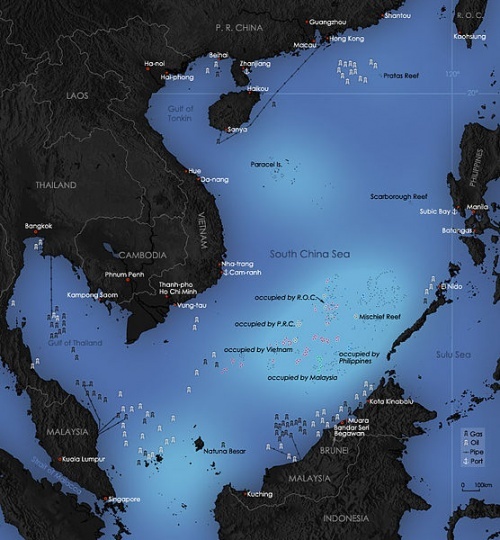
Vietnam wants to “internationalize” the dispute by bringing it before the UN and China does not is the simplest way of defining it. The dispute over the South China Sea group of around 750 very small islands known as the Spartlys also involves other neighbors. The Philippines, China, Vietnam, Malaysia, Brunei and Taiwan claim all or part of the Spratlys, which are believed to hold vast oil and gas reserves. In recent months, exchanges over the claims have grown more heated, particularly between China and Vietnam, and China and the Philippines.
Just looking at the geography, China’s claims would look the most remote. China would apparently need to in effect arrange a form of sovereignty island hopping, linking one claim to another. (The islands have no indigenous population that could help settle the dispute and as a whole constitute less than 4 square km in total)
On the other hand, China is the dominant political and military power in the region, with an air craft carrier soon coming to add further might to its claim. Strategically it would prefer to deal with each of the other contesting states separately and certainly not bring into the dispute the United Nations and/or International Court of Justice ICJ). Neither “internationalization” of the dispute and/or judicial proceedings are likely to deliver to Beijing as favorable outcome as “one on one” bargaining persuasion.
When Does it Become a “Threat to International Peace & Security”?
Some might assume that any international dispute may end up at the UN or ICJ. However, that is not accurate. India has resisted Pakistan’s every effort to make the Kashmir dispute between the two countries into a subject for UN discussion. Thailand had similarly tried to resist Cambodia’s efforts regarding disputed land border and Preah Vihear Temple claims. In each instance, there is little doubt that these disputes fall into the functional definition of “a threat to international peace and security.”
Vietnam Pressing its Claim & Internationalization
As a Permanent Member of the UN Security Council, it would appear that China might also have the ability to keep the “Spartly Islands” dispute out of the UN. However, at least Vietnam is up to the game, and is now pressing ahead with “military exercises” in the area to not only further solidify its territorial claims but also to promote the “internationalization” of the dispute (Vietnam has become increasingly vigilant and has been consulting with experts on the subject).
If the other claimants, besides China, press ahead with similar tactics it will become difficult for China to keep the UN and ICJ out of the dispute. Washington is fully cognizant, but it may be inclined to see the Spartlys’ as a bargaining chip with Beijing rather than necessarily taking a hard position. However, like most other maritime states Washington and most other global and regional powers would want to see the dispute resolved in such a way that would minimize potential limitations on commercial and military shipping. That generally may translate to less China or any sovereignty, the better.
ASEAN Factor
Vietnam, Malaysia, Philippines and Brunei also have one additional advantage, the ASEAN group. ASEAN has increasingly followed the EU model enhancing economic and political cooperation. It understands China in multiple ways, from potential threat to partner. ASEAN has increasingly brought its weight into disputes as Cambodia-Thailand and Myanmar, with mixed results. However, the Spartly Islands dispute is more straightforward in terms of interests of ASEAN members and non-member, China.
Better Together than Separately
It appears that Vietnam, Philippines, Malaysia and Brunei are learning the play. Expect the UN, ICJ as well as ASEAN to become more involved. While these relatively smaller states have competing claims with each other, they recognize that China will walk away with an outsized chunk unless they stick together rather than bargain separately with Beijing. An interesting curve ball-how will Taiwan’s claim play out, since it is not a member or recognized as a separate state from China by most of the UN. (Photo from Wikipedia)
Related Reports – “War Crimes Justice” Channel -
diplomaticallyincorrect.org/c/war-crimes-justice
By Ambassador Muhamed Sacirbey
Facebook Become a Fan at “Diplomatically Incorrect”
Twitter – Follow at DiplomaticallyX

